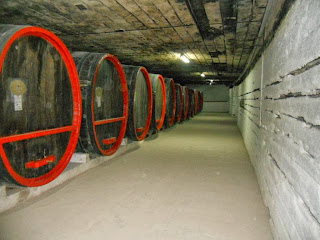Just a half hour drive north of the capital, Chisinau, is the village of Cricova. Circova is a widely known wine label here in Moldova. It was built inside the tunnels of a spent lime stone mine. It is about 65 meters below the surface and just the perfect temperature year round for the fermentation of wines. We took the tour of the " subterranean city". We took this handsome tram train down into the wine cellars. All the streets are named after various types of wine. There are small and large barrels. The wine in the large barrels is kept for about 4 years before it is bottled, the smaller barrels less time. These are oak barrels that give a tannin flavor to the wine. Oh by the way, this is the world's largest underground wine cellar. Our Moldovan guide explained how sparkling wines and champagnes (woops, excuse my French) are made. The racks of bottles are slowly changed over many days so that the sediment of the wine finally collects into the neck of the bottle. Yes, bottle by bottle. Finally there is a high tech process where the neck of the bottle is fast frozen causing a natural cork that is blown out by the pressure when the bottle is quickly opened and then re-corked. This eliminates the grape residue. We next went to an underground museum where we saw many private collections of wine bottles. Some were presents to the Russian President Vladimir Putin and some were gifted to the United States. Our US ambassador has brought two bottles of California wine to be kept there. One of the celebrities that visited here in 1966 was the Cosmonaut Yuri Gagarin. A world map shows all the places that Cricova wines are exported to. There were several fancy wine tasting rooms. One had a deep sea theme. Another the Presidential tasting room for foreign dignitaries. And a fireside room that had a fire place that actually worked 65 meters below the surface. And the room that we finally enjoyed sampling 2 white, 2 red, and 2 sparkling wines. The best was the sparkling wine called "sweet tears". Feeling better than when we came in, we now left for our next stop, Orhei Vechi. Stay tuned.

























They must have poured gobs of money into that place — into the wine-making machinery and into the opulent visitors' center. Stepping out of the reality of impoverished Moldova, I found that underground world bizarre. It was eerier still when I was told I had asked a "forbidden" question: "How much do those women get paid?"
ReplyDelete